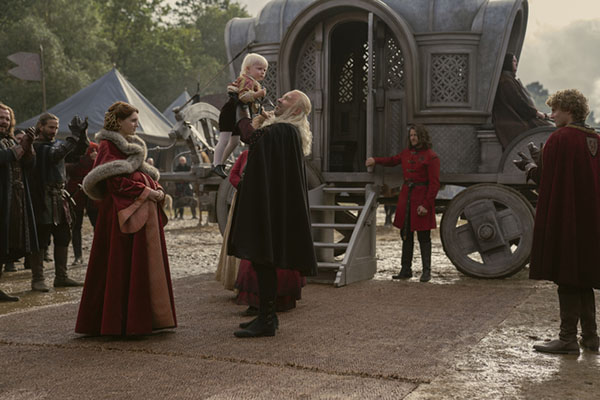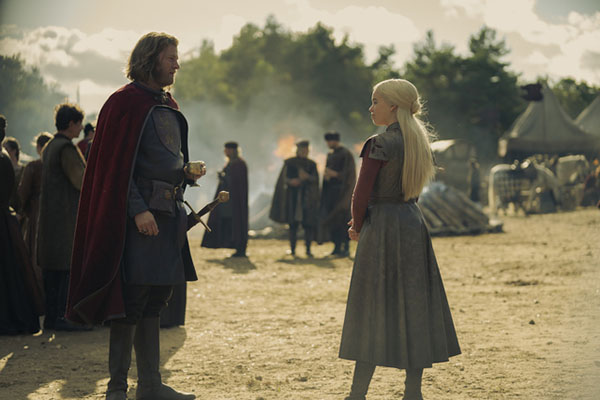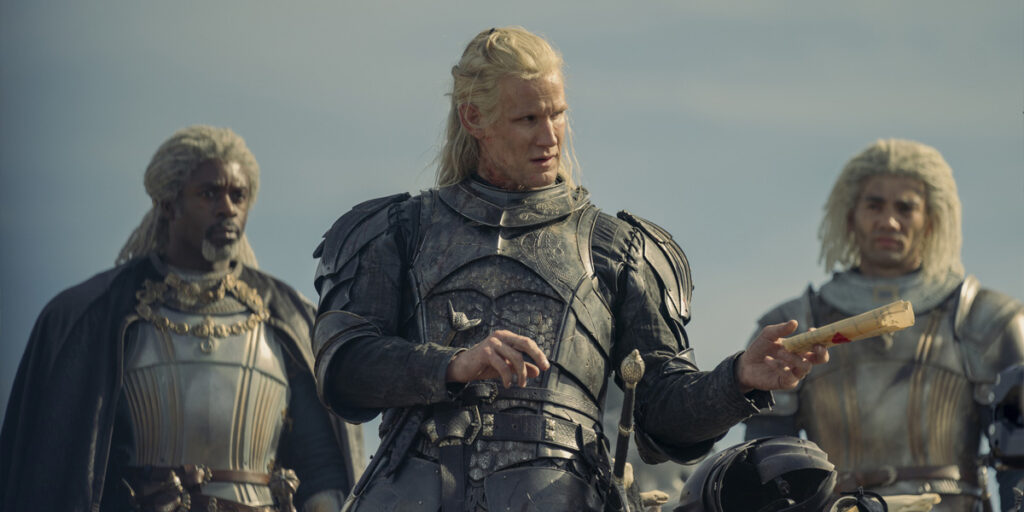Episode 3 of House of the Dragon finally treats us to our very first major battle of the season, as our characters fight to be seen for who they really are.
This week’s House of the Dragon is all about battles. It’s not just armies going to war against one another, but inner battles being fought between characters, such as King Viserys I Targaryen (Paddy Considine), Rhaenyra (Milly Alcock), Daemon (Matt Smith), and Alicent Hightower (Emily Carey). Episode 3, “Second of His Name,” begins by giving fans exactly what they want: dragons burning people alive. We see Daemon and his dragon Caraxes arrive at the Stepstones in the middle of the night to defy the Triarchy and the Crabfeeder’s (Daniel Scott-Smith) forces. A common theme I’ve noticed with the show is that violence has a purpose in House of the Dragon. In comparison, it seems like, more often than not, Game of Thrones relied on grotesque violence to shock people in order to create a conversation amongst viewers. House of the Dragon uses violence in a far smarter way. The Crabfeeder’s torturing methods are a great example of this. It is there to show the brutality of war — displaying enough detail to horrify you — but it doesn’t take that extra step to be overly savage. It takes a page from arguably the superior way to build tension: less is more.
From here, Gabe Fonseca and Ryan Condal’s writing continue to avoid confusion regarding the timeline of the series by carefully letting the audience know how much time has passed in-between episodes. This time around, three years have gone by since last week’s events. The realm is celebrating the second name day of Alicent and Viserys’ first child together, Aegon II Targaryen. It should be a cause for celebration, as the King and the Lords ready themselves to go on a royal hunt across the forest outside of King’s Landing. Yet, people are already scheming behind their own King’s back by suggesting that now that Viserys has a male child, that there is no need for Rhaenyra to remain the heir to the Iron Throne. A thread that will come to play throughout episode 3.
Tyland Lannister (Jefferson Hall) briefly interrupts Viserys’ attempts to show off his son to his loyal servants by bringing up the urgent matter of the War for the Stepstones. This would mark the third time since the pilot episode that somebody would mention the imminent threat that the Triarchy possesses, only for the King to dismiss it once again for less important affairs. As a way to push the issue aside and distract himself from making a firm decision, Viserys begins to ask for his daughter’s whereabouts.

Rhaenyra, in the meantime, is reading by the Godswood with the company of a singer who is performing a song for her in order to avoid her half-brother’s festivities. Her peace is quickly disturbed by the presence of Alicent, who is seeking to convince her to join the family as it is her duty as Princess. It’s both tragic and odd to see their relationship reach new developments. They went from being best friends to step-mother and daughter in such a short amount of time. And it isn’t as simple as their connection fell off, there are now power grabs that separate them even more. A Princess that is trying to hold on to any kind of freedom left for her to grasp, and a Queen who is being guided by her father to be at the very top of things.
At the royal hunt, things become clear as day when almost every single one of the noble lords and ladies of the realm disregard Rhaenyra’s presence, while uplifting 2 year-old Aegon. Rhaenyra says it best, “no one’s here for me.” She doesn’t just mean her father, whose parental guidance has been lacking since the death of Rhaenyra’s mother. Or Alicent, for that matter, after her marriage to Viserys destroyed any kind of bond she had with the Princess. No, with this line Rhaenyra is reflecting on the Seven Kingdoms as well. Everyone swore fealty to her in front of the Iron Throne, yet at the first sight of a potential male heir they are ready to run to the other side and abandon her claim merely because of her gender, which can be considered treason.
With three years passing by, Rhaenyra is now 17 years-old and she’s of age to accept marriage proposals from lords across Westeros. The first person to come to her with little to no filter about his intentions with the Princess is Jason Lannister, Tyland’s twin-brother. Jefferson Hall leaves quite an impression as he makes both characters distinct from one another. Tyland is more reserved and serious, while Jason is direct and arrogant. This, of course, causes a rift between father and daughter as Rhaenyra feels like she is being sold away. Ser Otto Hightower (Rhys Ifans) stops their bickering — before making a bigger scene in front of everyone present — by bringing to Viserys’ attention that a white hart has been spotted in the Kingswood. This gives Rhaenyra the opportunity to run away from the royal camps and into the woods on her horse.
Ser Criston Cole (Fabien Frankel) is prompted to go after the Princess, as it is his duty to protect her from harm’s way. Through these two wonderfully rich characters, we are treated to another meaningful conversation about one’s role in the world and how we can defy society’s standards. Rhaenyra argues that she feels like she doesn’t have a say in her life because of how women are perceived, that she feels useless. Cole counters her point by explaining how others would feel lucky to be in her position, and that she isn’t totally useless as she chose him to be a member of the Kingsguard above the rest of the inexperienced candidates. Their discussion shifts to the matter of Rhaenyra’s status as Queen-to-be, which he full-heartedly supports. Ironic, if you know how their relationship plays out on the page. Out of nowhere, though, they’re attacked by a wild boar, as Rhaenyra is forced to kill in order to defend herself. Earlier in the episode, she mentions how she was trying to avoid going on a hunt because she detest the screams of the innocent animals. I think this, in a way, is meant to symbolize her not wanting to draw blood, but being forced to by outside sources.

House of the Dragon thrives on the unspoken, on what isn’t directly visualized for the audience. It urges us to pay attention to every conversation happening on screen because, while on the surface it might seem pretty straightforward, what is underneath is what matters. This comes to fruition during Viserys’ continuous struggle to make firm decisions. He seems distracted and conflicted throughout episode 3, especially after learning of a white hart possibly roaming the Kingswood. He’s still obsessed with his dream about placing his male heir on the Iron Throne, despite Rhaenyra being his heir and Aemma’s death proving his dreams wrong. And although doubt can be spotted within him, Viserys does come to his daughter’s defense when Jason Lannister offers to take Rhaenyra to Casterly Rock after assuming she would be disinherited now that Aegon has been born. Perhaps for the first time since naming her his heir, Viserys realizes how the realm has diminished his daughter’s current position.
Otto seems to take advantage of this when he notices he might be able to manipulate the King into naming his grandson either the next King of the Seven Kingdoms, or by marrying him off to Rhaenyra in order to secure a seat of power for Aegon. It is obvious to us that he seeks to do this by using the symbolism of the white hart. The white hart is presumed to be a good omen, which everyone assumes is a sign of the Gods favoring Aegon on his name day. Viserys falls victim to this superstition, only to be disappointed when his huntsmen aren’t able to find the creature, but instead present him with a regular stag so the King does not leave empty handed. Whether intended by the writers or not, you can guess this situation is the thing that makes him finally make a firm decision in his own head. The white hart failed to show up for his son’s celebration? Fair enough, he will support his daughter’s claim as a result of this.
To bring home the thematic idea of Rhaenyra not feeling seen or supported throughout episode 3, the white hart appears to her out of the blue, on her way back to the royal camps. Viserys spends his entire stay at the Kingswood looking for a sign to help him decide whether or not he should change the succession. Instead of coming to Aegon, the white hart comes to Rhaenyra, symbolizing she is worthy to sit on her father’s throne, which is only reinforced when she decides to let the creature leave in peace rather than killing it to prove a point. This reads as classic Arthurian legends continuing to inspire the world and storytelling in George R.R. Martin’s fantasy epic.
Back in the Red Keep, once the celebration is over, Otto continues to plot for his family’s rise to power. He urges Alicent to convince Viserys to change the succession, despite his daughter not feeling comfortable to oppose Rhaenyra’s cause. She does try to spark the awkward conversation with her husband, but Viserys begins to rant about Rhaenyra’s disobedient behavior regarding marriage. Perhaps in a way to amend things with her friend, Alicent suggests Viserys should allow his daughter to make her own decisions and that eventually one day she will marry out of her own choice, which is something Alicent didn’t necessarily have a say on. To move away from the subject, the topic of the Stepstones caughts Alicent’s attention, as she questions the King’s decision to ignore the threat. This helps Viserys come to reason as he finally decides to send aid to his brother’s cause, while also giving Rhaenyra the opportunity to make her own mind in regards to whom she will marry in the future. In addition, he reassures her no one will come between her and the duty as Queen that awaits her.
In the Stepstones, the situation is dire, as Corlys Velaryon’s (Steve Toussaint) forces have failed to deal with the Triarchy in the three years he and Daemon have been at war against the Crabfeeder. Vaemond Velaryon (Will Johnson), Corlys’ brother, amongst other men, show signs of open mutiny against Daemon, as he is blamed as to why they’ve been losing men, ships, and any chance at coming out victorious from this conflict. Laenor Velaryon (Theo Nate), son of The Sea Snake, believes Daemon is the key to drawing the Triarchy’s army from the caves they have been hiding. Their battle strategy meeting is disturbed by Targaryen soldiers who carry a letter for Daemon from the King. After reading the content of the letter, The Rogue Prince proceeds to beat the messenger bloody.
We are not given an exact reason as to why he beats him up, other than we’re made to believe Daemon is infuriated at the thought that his brother doesn’t think he can win the war without his help. This prompts Daemon to embark on a suicide mission where he goes to the Crabfeeder’s camps by himself, making him believe he is surrendering. Here is where Daemon proves why he’s called The Rogue Prince, as he kills the men that were about to arrest him and runs directly to the Crabfeeder’s location as arrows fly towards him. Those arrows eventually meet their target, forcing Daemon to drop on the ground. Just when things seem lost, Corlys and his army arrive to save the day, while Laenor lights the island on fire with his dragon Seasmoke, and Daemon runs into the cave to kill the leader of the Triarchy’s army. He comes out of the darkness covered in the Crabfeeder’s blood, proclaiming Daemon victorious without the help of his brother.
Episode 3 of House of the Dragon has a very strong thematic throughline of battles being fought on different fronts. Viserys is still hanging on to his prophecies, until he finally makes peace with that by the end and lets Rhaenyra be her own person. Daemon obviously is trying to prove his worth, as is Rhaenyra, though in a completely different way because of her gender. They all come together very nicely in the end. It is as if they are embracing who they will become later in the story. Some people might complain about the final confrontation, but I love how we don’t see the fight between the Crabfeeder and Daemon. We all know how it was going to end anyway, so him coming out of the cave with his torso is way more powerful than a one-on-one fight scene. With our three main family members of House Targaryen ending their arcs on new ground by the end of episode 3, we can’t wait to see how this will affect their relationships in weeks to come.
Episode 3 of House of the Dragon is now available to watch on HBO Max.

